|
|
|
Sort Order |
|
|
|
Items / Page
|
|
|
|
|
|
|
| Srl | Item |
| 1 |
ID:
086422
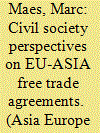

|
|
|
|
|
| Publication |
2009.
|
| Summary/Abstract |
This paper focuses on the positions taken by civil society organisations that actively campaign on trade policies. Trade campaigners oppose the neo-liberal approach to trade and development and advocate a much more gradual and prudent approach to trade liberalisation. They stress that trade liberalisation will only lead to sustainable development if it respects environmental and social concerns, including the gender dimension of trade; if trade liberalisation is properly owned, prepared and sequenced; adapted to the institutional and economic needs and capacities of the countries and people involved, and accompanied by all necessary flanking measures. Trade campaigners stress the need to maintain policy space and the necessary governance instruments to react to changing circumstances and address social and environmental concerns. They denounce the lack of information, consultation and participation provided by governments in trade policy formulation and negotiations and they campaign to raise awareness and create more room for debate and participation.
This article builds on a paper presented on 19-20 June 2008 at an UNU-CRIS Work Shop in Bruges on "Deep Integration and North-South Free Trade Agreements. EU Strategy for a Global Economy".
|
|
|
|
|
|
|
|
|
|
|
|
|
|
|
|
| 2 |
ID:
032125
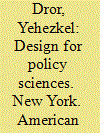

|
|
|
|
|
| Publication |
New York, American Elseviar, 1971.
|
| Description |
156p.
|
| Series |
Policy sciences book series
|
|
|
|
|
|
|
|
|
|
|
|
Copies: C:1/I:0,R:0,Q:0
Circulation
| Accession# | Call# | Current Location | Status | Policy | Location |
| 008778 | 320.6/DRO 008778 | Main | On Shelf | General | |
|
|
|
|
| 3 |
ID:
108731
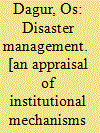

|
|
|
|
|
| Publication |
New Delhi, KW Publishers Pvt Ltd, 2011.
|
| Description |
xvi, 385p.
|
| Standard Number |
9789380502724
|
|
|
|
|
|
|
|
|
|
|
|
Copies: C:1/I:0,R:0,Q:0
Circulation
| Accession# | Call# | Current Location | Status | Policy | Location |
| 056382 | 363.34/DAG 056382 | Main | On Shelf | General | |
|
|
|
|
| 4 |
ID:
185715
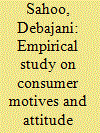

|
|
|
|
|
| Summary/Abstract |
The present study empirically investigates the motives behind users’ attitude formation, behavioural intention, and word of mouth towards electric vehicles. An online survey was conducted among Indian youths who are currently using or potential users of electric vehicles. Data were collected by applying a multi-stage stratified sampling method. The structural equation modelling technique was applied to examine the hypothesized model and tested the proposed hypotheses. This study results show that while positive and social motives influence positive attitudes, the negative motives discourage and negatively affect electric vehicle adoption. The moderating impact of buyer involvement (high vs low) between motives and attitude was also tested. The study findings suggest that stakeholders can shape the motives through government policy and strategic action. Thus, this study provides directions that there is a need for subsidies and incentives, such as hassle-free registration at less cost, tax waive offs from central, state and local government, and also a strategic private-public partnership for infrastructure development to reduce negative motives and boost electric vehicles penetration.
|
|
|
|
|
|
|
|
|
|
|
|
|
|
|
|
| 5 |
ID:
127069


|
|
|
|
|
| Publication |
2013.
|
| Summary/Abstract |
Examining a range of policy areas in which the European Union (EU) acts externally - notably trade, development, climate change and foreign and security policy - this article considers the notion that the years since the mid-2000s have witnessed a decline in EU actorness/effectiveness. In evaluating EU performance, the article employs the interrelated concepts of presence, denoting EU status and influence; opportunity, denoting the external context of EU action; and capability, referring to EU policy processes and instruments, with particular reference to the impact of the 2009 Lisbon Treaty. It is contended that achievement of the increased capability envisaged by the Lisbon Treaty, together with resolution of the Eurozone crisis, with its deleterious effect upon the Union's presence, would not fully compensate for the loss of opportunity provided by the changing international structure.
|
|
|
|
|
|
|
|
|
|
|
|
|
|
|
|
| 6 |
ID:
124542
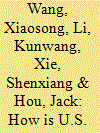

|
|
|
|
|
| Publication |
2013.
|
| Summary/Abstract |
Utilizing a political economy approach towards trade policy formulation, we examine the case of how the U.S. House voted on the PNTR status for China. Our focus is to analyze the factors affecting the legislators' voting behavior and to deduce the rationale behind these factors. We find that the U.S. trade policies towards China represent a balanced equilibrium based on interactions between the government and special interest groups. The individual characteristics of the legislators were not important in the process. Predictions of neo-classical trade models regarding the attitudes of various groups on trade liberalization could not be fully validated in the voting outcome of the PNTR bill.
|
|
|
|
|
|
|
|
|
|
|
|
|
|
|
|
| 7 |
ID:
106718
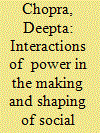

|
|
|
|
|
| Publication |
2011.
|
| Summary/Abstract |
This paper focuses on the interactions of power as analysed through the formulation story of a recently enacted social policy, the National Rural Employment Guarantee Act (NREGA), India. It explains the various drivers that led to the passing of this policy, with a view to analysing the extent and nature of power as was played out in the making of this policy. The paper sets out the way in which social policy formulation can be understood to be arising from interactions and linkages between individual actors, who together make up policy coalitions and networks. These interactions are described through a four-fold classification of processes (parliamentary, executive, party political and civil society) into which the actions and contributions of these actors feed, giving rise to an iterative, messy and complex reality. Power in the policy formulation network is shown as multi-sited as well as relational. The paper concludes with an endorsement for reconfiguring the geographies of power in the form of a kaleidoscope of actors and events, within and through which power flows and is exercised.
|
|
|
|
|
|
|
|
|
|
|
|
|
|
|
|
| 8 |
ID:
109868
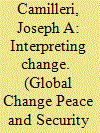

|
|
|
| 9 |
ID:
134348
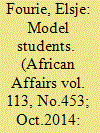

|
|
|
|
|
| Summary/Abstract |
Contemporary scholarship on policy making in Africa tends either to view the process as being entirely divorced from international policy lessons and experiences, or to portray policy makers as prone to unreflective imitation of whichever countries happen to be economically and politically ascendant. Kenya's Vision 2030 demonstrates both of these assumptions to be flawed: not only have Kenyan planners and technocrats consciously emulated foreign models in the formulation and execution of this long-term development plan, but the way in which they have done this is embedded in a historical reading of Kenya's development trajectory as well as the trajectories of those countries from which lessons are drawn. Thus, Vision 2030 bears the imprint of Singaporean and Malaysian policies, rather than only the more modish “Chinese Model”. Far from heralding the birth of an entirely new East Asia-inspired development paradigm, this emulation echoes the early years of post-colonial Kenya, when technologically optimistic planners such as Tom Mboya sought to guide the country along the path of modernization, deploying tools such as technocratic rule, rapid economic growth, and social engineering. The Kenyan case therefore demonstrates processes of policy emulation in Africa to be both more prevalent and more nuanced than is commonly assumed.
|
|
|
|
|
|
|
|
|
|
|
|
|
|
|
|
|
|
|
|
|